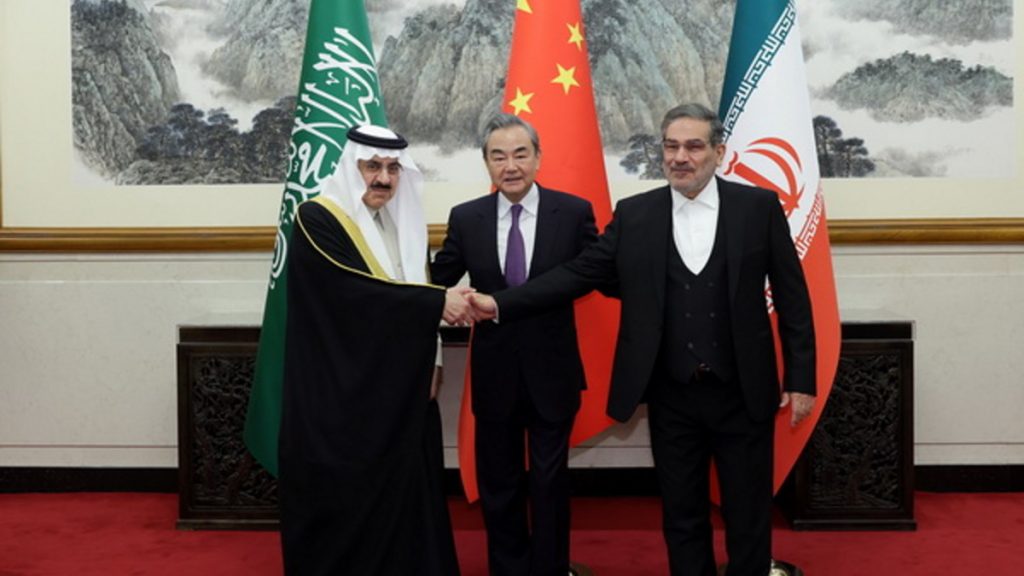Forget Russia’s invasion of Ukraine, recent news of China’s facilitation of the normalization of diplomatic ties between Iran and Saudi Arabia could be the geopolitical earthquake of the 2020s.
On March 10, 2023, Saudi Arabia and Iran announced their agreement to restore diplomatic ties. This development comes after years of geopolitical tensions between the two Islamic powers in the Middle East. China was the host of the talks that led to this diplomatic development, which could be the first step in ending decades of conflict between the two regional powers.
Iran and Saudi Arabia have been engaged in a de facto proxy war since 1979, the year Islamist activists toppled the imperial government of Iran and replaced it with an Islamic Republican government. Once firmly in power, the Islamists in Iran quickly got into a drawn-out proxy conflict with Saudi Arabia in a competition to become de facto leaders of the Islamic world. The two countries have found themselves supplying economic and military aid to competing sides in conflicts in Iraq, Lebanon, Syria, and Yemen, among other countries.
Saudi Arabia itself has also been a theater of this sectarian conflict. The Gulf Arab state boasts a large Shiite minority of roughly 12%, largely concentrated in the Eastern Province, the country’s principal petroleum hub. Tensions between the two countries rapidly escalated in 2016 after Iranian protesters stormed the country’s embassy in Tehran after Saudi authorities executed a prominent Saudi Shiite cleric. The Saudis quickly responded by breaking diplomatic ties with Islamic Republic.
Tensions mounted in 2019, when a critical Saudi oil facility was attacked by a drone and missile onslaught that temporarily disrupted half of the country’s crude oil output. The Houthi rebels in Yemen, who many Western experts allege receive substantial Iranian support, assumed responsibility for the attack. However, US officials believe that Iran oversaw and gave the green light to this attack.
Ever since these attacks, tensions between the two Middle Eastern countries have somewhat subsided but diplomatic relations remained fraught. However, high profile visits by Chinese President Xi Jinping to Saudi Arabia in December 2022, that was followed up by a seemingly hostile statement by China and its Arab partners condemning Iranian geopolitical activity in the Middle East, and Iranian president Ebrahim Raisi’s visit to Beijing in February suggested that China was playing a mediatory role in order to alleviate the two Middle Eastern countries’ tense relations.
In this intra-Islamic cold war, China does not have a dog in the fight. For one, China enjoys intimate trade relations with both Iran and Saudi Arabia. In 2022, China engaged in nearly $16 billion and 100 billion in bilateral trade with Iran and Saudi Arabia, respectively. Due to China’s growing involvement in the Middle East through its Belt and Road Initiative, China has a vested interest in maintaining stability in the region. For it to fully realize its economic potential in the Middle East, China cannot allow this region to be a hotbed of perpetual instability.
China facilitating peace in the region marks a stark contrast from the United States, the preeminent external actor that’s shaped international affairs in region. The US’s outsized involvement in the region is well-documented. The coups it has facilitated (Iran in 1953), its support of both sides in the Iran-Iraq War (1980-1988), its two invasions of Iraq (1991 and 2003), and its sponsorship of the Arab Spring (2011) are all signs of the US being a chaos agent in the region.
By contrast, China appears to be a force for stability due to the non-ideological nature of its foreign policy which is more focused on trade and non-interference in country’s domestic affairs. Undeniably, China will not be funding NGOs to topple governments that are insufficiently pro-LGBT or aren’t up to pace with regard to governing trends in woke, liberal democracies.
Should China maintain its foreign policy of non-interference, not engage in military adventures abroad, facilitate trade, and find constructive diplomatic solutions to geopolitical conflicts, it will inevitably look like a more attractive partner than the current hegemon in the US.
American policymakers must realize that American dominance is not an eternal guarantee. In fact, a few more foreign policy slip-ups and economic reversals at home could see the US leapfrogged on the world stage by the likes of China. Arrogance and an obviousness to new geopolitical realities can humble even the mightiest of empires. Polities that label themselves as “exceptional” are not exempt from this trend.
